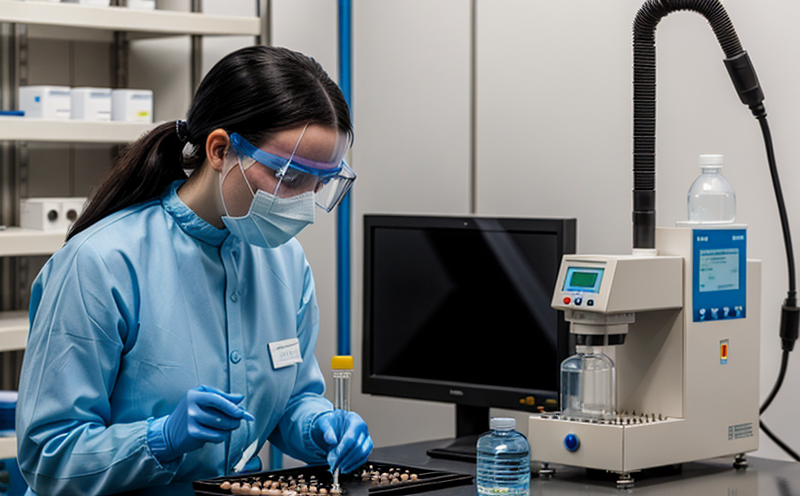Arsenic Impurity Profiling Testing
In pharmaceutical testing, ensuring drug purity is paramount. Arsenic impurities can pose significant health risks and thus require stringent control measures. The presence of arsenic in medicinal products can arise from various sources such as raw materials, manufacturing processes, or even historical contamination during production.
The process of arsenic impurity profiling involves comprehensive analysis to identify all forms of arsenic present within a drug substance or finished dosage form. This includes both elemental arsenic (As) and its compounds such as inorganic arsenicals like arsenite (As(III)) and arsenate (As(V)). The significance of this testing lies in the fact that even trace amounts of arsenic can have toxicological implications.
According to ISO 21967, which provides guidelines for arsenic analysis in pharmaceuticals, it is essential to employ sensitive analytical methods capable of detecting low levels of arsenic. Commonly used techniques include atomic absorption spectrophotometry (AAS), inductively coupled plasma mass spectrometry (ICP-MS), and high-performance liquid chromatography with inductively coupled plasma mass spectrometric detection (HPLC-ICP-MS).
The testing process begins with sample preparation. This typically involves dissolving the drug substance or product matrix in a suitable solvent, followed by filtration to remove particulates. The filtrate is then subjected to further purification steps if necessary before undergoing analysis.
Once prepared, the samples are analyzed using one of the aforementioned analytical techniques. During this process, it's crucial to consider potential interferences and matrix effects that might affect the accuracy of results. For instance, certain excipients or degradation products could interfere with the detection of arsenic species.
The data generated from these analyses is used to construct an arsenic profile for each batch of the drug substance or finished product. This profile helps in understanding not only the levels but also the distribution and forms of arsenic present. It allows quality managers, compliance officers, R&D engineers, and procurement teams to make informed decisions regarding process improvements and material sourcing.
Given the critical nature of arsenic impurity profiling, laboratories must adhere strictly to standardized procedures as outlined in various international standards such as ISO 21967. These protocols ensure consistency across different batches and facilities, enhancing reliability and comparability of results.
The importance of this testing cannot be overstated, particularly considering the potential health risks associated with arsenic exposure. By implementing thorough arsenic impurity profiling tests, pharmaceutical companies can significantly reduce the risk of adverse effects on patients while maintaining regulatory compliance.
Eurolab Advantages
At Eurolab, our commitment to excellence in pharmaceutical testing sets us apart from other laboratories. Our state-of-the-art facilities equipped with cutting-edge technology ensure precise and reliable results for arsenic impurity profiling.
We employ highly skilled scientists who are experts in their field, using the latest methodologies and standards prescribed by international bodies like ISO 21967. This expertise allows us to provide accurate data that can be trusted for decision-making purposes.
Our comprehensive approach includes not only technical proficiency but also robust quality management systems that adhere to strict regulatory requirements. By leveraging these systems, we maintain consistency and accuracy in our testing processes.
We offer fast turnaround times without compromising on the quality of our services. This efficiency is particularly beneficial for clients who need timely results to meet their operational needs or deadlines imposed by regulatory authorities.
Moreover, Eurolab prides itself on providing personalized service tailored to individual client requirements. Whether it's conducting routine testing or executing complex projects involving multiple analyses, we ensure that each project receives the attention and resources needed for success.
The combination of advanced instrumentation, experienced personnel, stringent quality controls, and customer-centric approach makes Eurolab a preferred choice among pharmaceutical companies seeking reliable arsenic impurity profiling services.
Why Choose This Test
Selecting the right testing method for arsenic impurity profiling is crucial given its critical role in ensuring drug safety. Here are several reasons why choosing this test is advantageous:
Regulatory Compliance: Adherence to stringent regulatory requirements ensures that pharmaceutical products meet all necessary standards set forth by agencies like the FDA, EMA, and WHO.
Patient Safety: By eliminating arsenic impurities, we contribute directly to enhancing patient safety and reducing potential health risks associated with exposure to this toxic element.
Process Improvement: Identifying arsenic sources helps pharmaceutical manufacturers pinpoint areas where process improvements can be made to minimize contamination risks.
Quality Assurance: Consistent testing results contribute significantly towards maintaining high standards of product quality, which is essential for building and sustaining trust with consumers.
Supply Chain Transparency: Knowing the arsenic content in raw materials allows companies to maintain transparency throughout their supply chains, fostering greater confidence among stakeholders.
Research & Development: Accurate data on arsenic impurities aids researchers and developers in optimizing formulations and processes, leading to more effective medications.
Competitive Advantage and Market Impact
The ability to accurately profile arsenic impurities provides significant competitive advantages in the pharmaceutical industry. Here's how:
Brand Reputation: Demonstrating a strong commitment to product safety enhances brand reputation, thereby attracting more customers.
Market Leadership: By offering superior testing capabilities, companies can position themselves as leaders in quality assurance and innovation within the market.
Patient Trust: Ensuring that drugs are free from harmful contaminants fosters trust among patients, which is crucial for long-term relationships with consumers.
Supply Chain Optimization: Understanding arsenic sources helps streamline supply chains by identifying reliable suppliers and optimizing production processes.
Innovation Opportunities: Accurate data on impurities can lead to new discoveries and advancements in drug development, opening up opportunities for innovation.





